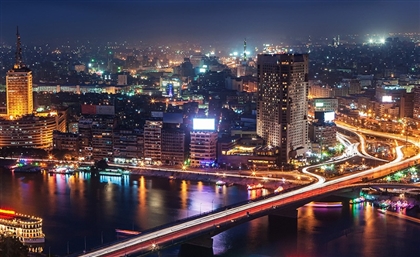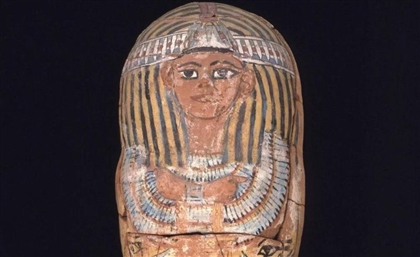The Evolution of Egyptian Curls in a Split End Society
We know that guns are a weapon, but how about curls?
There has been a wave of apathy overcoming Egypt, mixed with a knack for dismantling social norms during the period of stagnation following the 2011 revolution. While a day used to never go by without hearing a remark like mankoosha being thrown at you in the streets, people have generally become more accepting towards diversity. Alternatively, those receiving criticism might have become immune to disapproval, and according to foolproof evidence conjured by Gallup, the streets have become safer too.
The global natural movement began in the early 2010s; first booming in the United States. Egypt, on the other hand, caught up with this movement a little later on. Trends and politics were growing staler as they are wont to do, and so people have started adding their own colour to society via music, arts, small businesses, fashion—and now hair.

Hair salons of the past—what society would deem hospitals for hair—were of no help when it came to big, voluminous afros. Curly hair would be cast with dirty glances, proceeding to an interrogation by the hairstylist who assumed that you didn’t take care of your curls. Curly-headed women trying to figure out their hair patterns were instead judged as lazy and/or dirty—or more colloquially, me3afena. "Tab garabti tesara7i sha3rek? Tab ghasalteeh?"
Girls and women were conditioned to believe that their hair needed to be fixed as if broken.
For the longest time, Egyptian women had an identity crisis with regards to their hair. From a young age, mothers would tug and pull at their daughters’ hair, trying to pull it into a tight and neat ponytail, rather than the unruly, wild and disobedient mess it usually is. Then as soon as girls hit puberty and start caring about their appearances, they would succumb to using heat to straighten their curls on a regular basis.
They were conditioned to believe that their hair needed to be fixed as if broken, and resorted to extremes such as hours of applying chemical relaxers that burned the scalp, or using heat on their hair for that to-die-for shine. This of course meant declining invitations to go swimming and avoiding water at all costs, packaged with permanent damage to their self-esteems.
Now, with global natural movement in full swing, curly hair salons in Egypt have been established in several areas throughout Cairo, catering to the masses of women who were left in the dark.
S Hair Studio - one of the few curly hair-specialised salons - devote their services to refining and reviving curls without using heat or chemicals.
Sarah Abdelrazek - founder of the studio - attempts to cater to Egyptian customers not only by acknowledging that curls are an inherent part of our society - being deeply ingrained in our DNA - but by also acknowledging different income backgrounds. Abdelrazek said that they try as much as possible to include different price ranges by varying their products from top-shelf imported stock to homemade and local items.

“People are going natural not only with their hair, but also skin,” Abdelrazek told me. “You see a lot of people going through a sort of spiritual awakening lately, wanting to eliminate harmful substances from their lives and switching to natural products.”
Going natural is a long journey that doesn’t only help you discover your curls, but also boosts your confidence and identity—essentially helping you find yourself on the long run.
People have been shedding these old layers which are subscribed to outdated beliefs or societal fears - many of which dictate how women should behave, and what is appropriate or respectable and what is not.
One of the roots of the Egyptian natural movement, according to Abdelrazek, is The Hair Addict, an online Facebook group dedicated to Egyptian women’s curls. “The Hair Addict is an entire community full of women who support each other by giving advice based on their own experience with their hair type and local products they come across,” Abdelrazek said.
From another perspective, Hadear Kandil - founder of the online Arab curls community m’laulau - stated in an interview with popular online platform Naturally Curly her belief that the women’s curl-liberation happening in Egypt is a result of the 2011 revolution. “People are expressing themselves in different ways. People have been shedding these old layers that subscribed to outdated beliefs or societal fears, many of which dictate how women should behave, and opinions on what is appropriate or respectable and what is not,” Kandil said.
While we still have a long way to go - grappling with more serious issues like education, gender, and religious education - women are finally gaining more of an open platform for self-expression and identity in terms of hair. There still remains a large percentage of society which is disadvantaged and unexposed to the natural movement, but Abdelrazek reiterates that these people are not overlooked. Taking care of your curls can be as simple as taking a visit to the mashtal to obtain an aloe plant, or the attar for a jar of coconut oil or a combination of your favorite oils.
What used to be a daily struggle and a nuisance is now exciting and liberating to experiment with; however, the country's unsteady economy still doesn’t make it easy for everyone to buy the appropriate number of products necessary every month—which is a lot of products—like you easily would at a CVS store in New York.
Instead, every woman goes through the most appropriate and customised routine for her hair, testing out what works and what doesn’t, until a sort of weekly routine is established. Wash day, refresh day, air dry or diffuse, and so on. But whatever it is that’s going on, the obsession with looking like a front-cover magazine model has diminished, like a kind of awakening. The problem was never in the curls; the problem was in the society at large which shamed curls and tried to “fix” it as if it needed a solution. Curls—once presented in movies and TV shows as crazy or quirky—are now worn by many in weddings, parties and on TV.
What was once seen as lazy is now seen as effortless, and what was once odd is now a tool for self-expression.
Main image by MO4 Network.
- Previous Article Saudi Embassy in Cairo denies Sending WhatsApp Alert
- Next Article Famous Egyptian Honey Brand Could Give You Cancer
Trending This Week
-
May 01, 2024
























